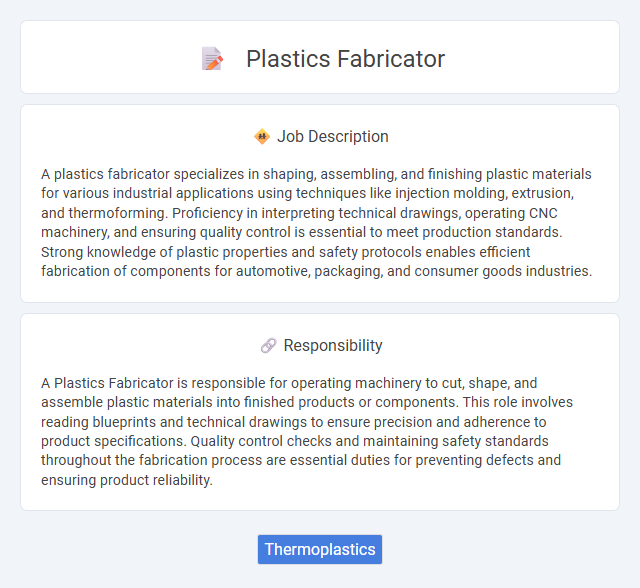
A plastics fabricator specializes in shaping, assembling, and finishing plastic materials for various industrial applications using techniques like injection molding, extrusion, and thermoforming. Proficiency in interpreting technical drawings, operating CNC machinery, and ensuring quality control is essential to meet production standards. Strong knowledge of plastic properties and safety protocols enables efficient fabrication of components for automotive, packaging, and consumer goods industries.
Individuals with strong attention to detail and manual dexterity are likely to perform well as plastics fabricators. Those who can work in environments involving repetitive tasks and some exposure to industrial materials may be suitable for this role. Candidates with physical stamina and a preference for hands-on work could find this job more compatible with their skills and work style.
Qualification
A plastics fabricator typically requires a high school diploma or equivalent, combined with specialized training in plastic fabrication techniques such as thermoforming, injection molding, or extrusion. Proficiency in reading blueprints, operating CNC machines, and understanding safety protocols is essential. Experience in handling various plastic materials and strong problem-solving skills enhance job performance and career advancement prospects.
Responsibility
A Plastics Fabricator is responsible for operating machinery to cut, shape, and assemble plastic materials into finished products or components. This role involves reading blueprints and technical drawings to ensure precision and adherence to product specifications. Quality control checks and maintaining safety standards throughout the fabrication process are essential duties for preventing defects and ensuring product reliability.
Benefit
A plastics fabricator position likely offers benefits such as competitive wages, healthcare coverage, and opportunities for skill development. Employees may gain hands-on experience with advanced manufacturing technologies, increasing their marketability in the industry. Job stability and potential for career advancement in the growing plastics sector are probable advantages.
Challenge
Plastics fabricators likely face challenges related to precision and consistency when shaping or assembling plastic components, especially with intricate designs or tight tolerances. Equipment malfunctions or variable material properties may pose obstacles that require troubleshooting and adaptation. The probability of needing strong problem-solving skills and attention to detail is high due to the complexity of working with diverse plastics and manufacturing techniques.
Career Advancement
Plastics fabricators enhance their career prospects by gaining expertise in advanced molding techniques, CAD software, and quality control processes. Certifications such as OSHA safety training and Lean Six Sigma improve employability and open pathways to supervisory or engineering roles. Continuous skill development and familiarity with innovative materials enable progression into specialized positions and management within manufacturing sectors.
Key Terms
Thermoplastics
Thermoplastics fabricators specialize in shaping and assembling materials such as polyethylene, polypropylene, and polycarbonate using processes like injection molding, extrusion, and thermoforming. Mastery of material properties, including melting points and chemical resistance, ensures precision in producing durable components for automotive, aerospace, and consumer goods industries. Expertise in CNC machining and CAD software enhances efficiency and quality control throughout the fabrication process.
 kuljobs.com
kuljobs.com